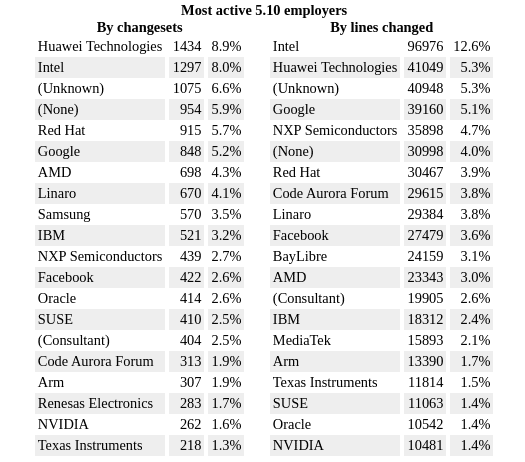
For a couple of years now, Intel has been leading the code contribution ranking for the development of Linux Kernel by the number changeset or number of lines changed.
According to the latest statistics reported on LWN.net, Intel tops the chart as one of the most active employers for Linux Kernel 5.10 LTS development cycle.
Intel’s contribution is nothing out of ordinary. It’s Huawei that adds the surprise here.
With Intel, Huawei is also known to have made consistent major contributions to the kernel code in recently. It has reached a new milestone with Linux Kernel 5.10.
Huawei contributed the most by the number of changesets. Intel contributed the most by the number of lines changed.
Statistics from the 5.10 Kernel Development Cycle
As per the stats published by Jonathan Corbet on LWN.net, a lot happened along the Linux Kernel 5.10 development cycle.
Of course, if you are interested to know all the details, you might want to read the original report, but the key highlight would be the contribution made by major companies (or the employers of developers working on the kernel development).

Intel and Huawei Technologies are among the top 2 contributors here. To be specific, the contribution by the developers working for Intel is 12.6% (with 96976 lines changed) and 8.0% by the number of changesets.
For developers working for Huawei, they made a significant 8.9% of contribution (with 1434 changesets) and 5.3% (with 41049 lines changed).
Of course, this is a good reputation for the employers and also says a lot about the companies putting strong effort for Linux Kernel development, which is always a good thing.
You can also notice many significant companies contributing like SUSE, AMD, NVIDIA, Google, IBM, Samsung, and Red Hat among others.
Even though Linux Kernel 5.10 was an LTS release, the year 2020 was tough on many people including some maintainers of the Kernel with health issues. However, overall, the kernel development cycle made a good progress last year along with a bunch of improvements coming to the upcoming kernel versions this year.
Why is Huawei contributing more to Linux kernel?
Huawei has several products and services that rely heavily on Linux. Its smartphones that used Android and its new mobile OS Harmony is most likely a revamped Android and thus based on Linux.
Apart from that Huawei also offers Huawei Cloud services to compete with the likes of AWS and Google Cloud. Obviously, it needs to customize the Linux kernel to power its cloud infrastructure.
Huawei had also unveiled its own Linux distribution openEuler last year.
Due to its close ties with the Chinese Communist Party (CCP), suspicious activities and espionage accusations, Huawei has turned pariah in the tech world today.
Alibaba CEO Jack Ma’s disappearance is an example that Chinese companies have to toe the lines set by CCP event at the cost of losing business overseas.
Your opinion on this topic is welcome. Please use the comment section to share your thoughts.
- Even the biggest players in the Linux world don't care about desktop Linux users. We do.
- We don't put informational content behind paywall. Your support keeps it open for everyone. Think of it like 'pay it forward'.
- Don't like ads? With the Plus membership, you get an ad-free reading experience.
- When millions of AI-generated content is being published daily, you read and learn from real human Linux users.
- It costs just $2 a month, less than the cost of your favorite burger.
Become a Plus Member today and join over 300 people in supporting our work.









